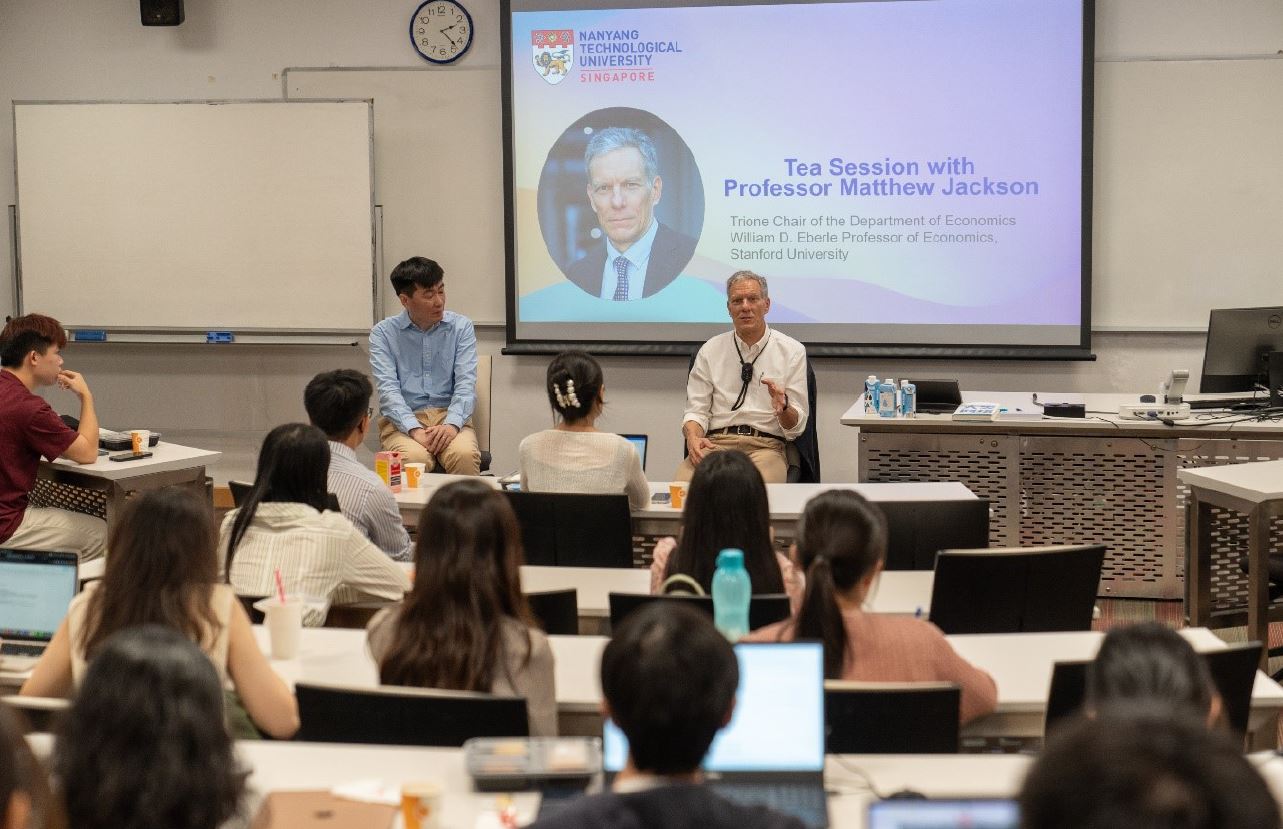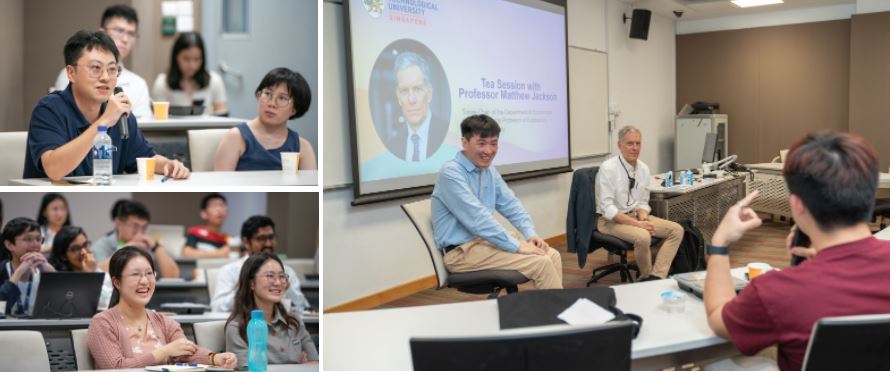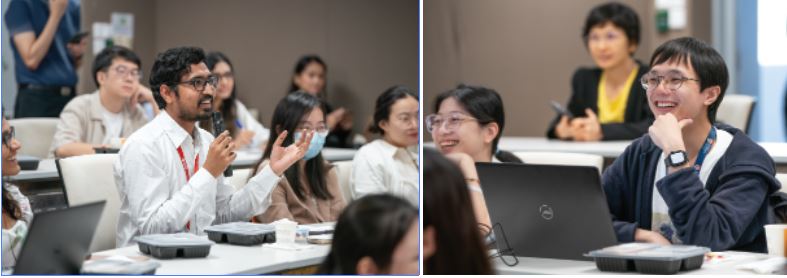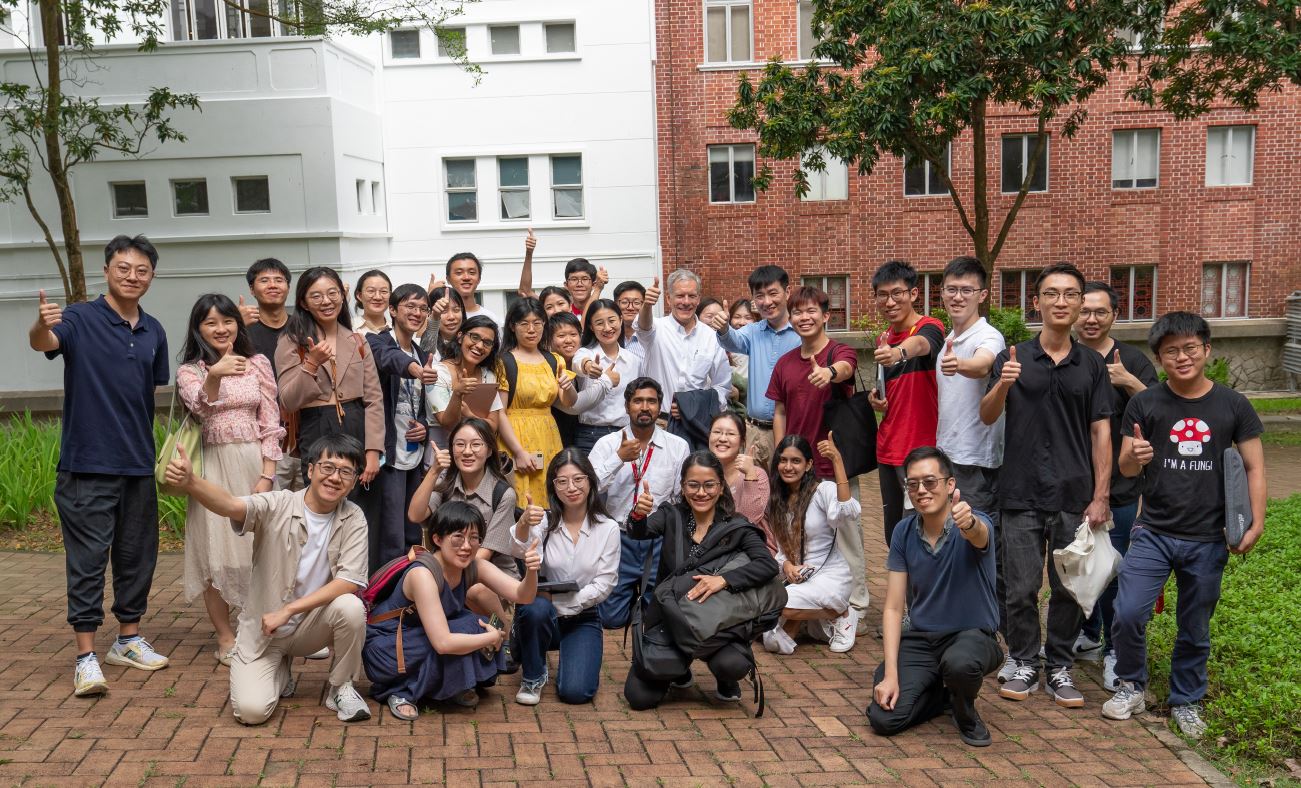Renowned economist Prof Matthew Jackson’s Tea Session with NTU Scholars and PhD Students
Jointly organised by IAS NTU and the School of Social Sciences | 27 July 2023, SHHK Seminar Room, NTU
From conversations about current affairs to valuable life lessons, students from Nanyang Technological University were treated to a truly unique sharing session by legendary economist Matthew Owen Jackson, the William D. Eberle Professor of Economics at Stanford University.

Prof Matthew Jackson (right) with Assoc Prof Bao Te (HSS), the host and moderator of the tea session.
Prof Jackson is a pioneering master in the field of social and economic networks. His 1996 publication, “A Strategic Model of Social and Economic Networks” with Prof Asher Wolinsky, is reputed to be the basis of many social network analysis models used to this day. Throughout Prof Jackson’s distinguished career, he has illuminated the role of networks in important socioeconomic factors such as economic mobility, income inequality, social capital, and economic connectedness. For his groundbreaking academic contributions, Prof Jackson has been awarded a plethora of outstanding accolades, including the BBVA Frontiers of Knowledge Award in Economics, Finance, and Management. It was therefore no surprise that the seminar room was filled with students from different schools in NTU, eager to meet Prof Jackson and listen to his words of wisdom.
When asked about the best route one should take to improve one’s socioeconomic status, Prof Jackson replied that social capital is a crucial factor which is commonly overlooked. He stated that environments which encourage people of different economic backgrounds to foster relationships are much more likely to see upward mobility of the less fortunate. Prof Jackson highlighted practical examples of the integral role of social connectedness, such as its ability to create exclusive career opportunities and job referrals. His best advice for students who want to improve themselves, beyond simply boosting future socioeconomic status, is to step out of their comfort zones and connect with new people. He testified that this is the most effective way to find unique opportunities, be exposed to interesting ideas, and to advance oneself intellectually.

The students enjoying the interactive discussion with Prof Matthew Jackson.
Prof Jackson also shared his thoughts about the present state of the world in terms of political and social interests of countries. In addition, he touched on how the trajectory of economic research should develop to address current affairs. Referring to one of his papers with Prof Stephen Nei, titled “Networks of Military Alliances, Wars, and International Trade”, he emphasised that countries which trade well together tend to have fewer conflicts. Prof Jackson added that it is worrying to see global trends of increasing trade limitations and immigration sanctions. He also stated that the impact of trade on social mobility and conflict is vastly understudied, identifying it as an area with enormous potential in economic research.
As the session progressed, the conversation shifted to a more light-hearted yet philosophical tone. When asked about his knack for teaching and tips on being a better educator, Prof Jackson shared the need to put oneself in the shoes of the audience. He mentioned the importance of always thinking about the easiest way to explain a concept, and being mindful of the core idea that needs to be communicated.

Engaging students during the Q&A session with Prof Jackson.
In response to a question on the qualities he values most in a competent researcher, Prof Jackson stated that creativity is imperative and reiterated the power of braving unfamiliarity. He commented that he frequently attends conferences outside the field of economics, such as those in sociology, physics, and mathematics. This allows him to meet and be inspired by new people, motivating him to think about different questions or techniques to facilitate his own research. He also mentioned that a highly inquisitive, passionate, and unsatiated mind is what allows good researchers to become exceptional.
The final question of the session was unexpected but interesting. “Many of us here are close to the age where most people get married. Do you have any advice for us in this aspect?” With a wide grin, Prof Jackson replied, “I’ve been blessed with a very happy marriage. Find someone who shares similar preferences, aspirations, and views on things, but is different in a way that you both can complement each other nicely”.

Written by Erwin Wong Chi Liang | NTU Research Scholar, SSS














/enri-thumbnails/careeropportunities1f0caf1c-a12d-479c-be7c-3c04e085c617.tmb-mega-menu.jpg?Culture=en&sfvrsn=d7261e3b_1)

/cradle-thumbnails/research-capabilities1516d0ba63aa44f0b4ee77a8c05263b2.tmb-mega-menu.jpg?Culture=en&sfvrsn=1bc94f8_1)



